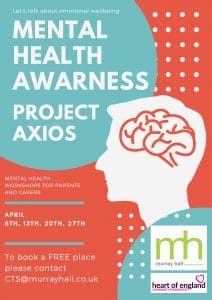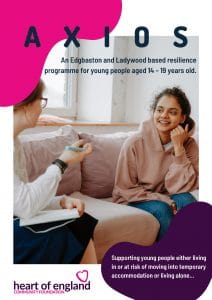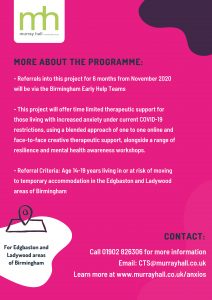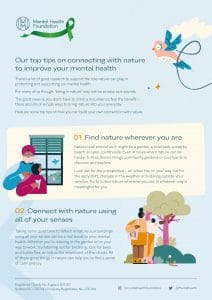Mental Health at Shenley Academy
Our vision:
Our vision is to ensure all stakeholders have the skills and environment to thrive. We put mental health and well being at the heart of everything we do.
“Mental Health Matters”
We are committed to working towards the Wellbeing Award, working with Optimus Education as part of the Shaw Trust. The Wellbeing Award for Schools framework actively promotes emotional wellbeing and mental health for your staff. Ensures that emotional wellbeing and mental health is regarded as the responsibility of all.
First of all…it’s okay not to be okay!
We all have mental health, which can fluctuate on a daily basis. Sometimes, we can feel overwhelmed, under the weather, or that something just isn’t right, and it’s a sign that our wellbeing isn’t as tip top as it could be.
In this section, we want to highlight some Key Mental Health Concerns, and how to gain support.
Below are some key websites of support which you can use for adults and children if you ever need any wider insights or more in-depth support as well.
Anxiety:
Anxiety is often described as a feeling of fear or unease – and it’s something everyone experiences at times. Feeling anxious is a perfectly natural reaction to some situations.
Anxiety can help us to focus or to take extra care when needed, but if it gets too much or goes on for a while, it can affect our daily life.
Luckily, there are ways to deal with anxiety that really work, and spotting the signs of anxiety is the first step.
Tips on Managing Anxiety:
Try building these self-care tips into your daily routine, as doing them regularly can make a big difference.
- Shift your focus: Some people find mindfulness and meditation (including breathing exercises and relaxation) help to calm anxiety and reduce tension by focussing awareness on the present moment. Try these NHS recommended relaxation exercises.
- Try self-help techniques: Our short videos and practical guides to cognitive behavioural therapy (CBT) can help you deal with worries, anxiety and unhelpful thoughts by working through problems in new ways and helping you build resilience. Try these self help CBT techniques.
- Understand your anxiety: Keeping a diary of what you are doing and how you feel at different times may help you understand why you’re anxious and identify ways to manage or get rid of anxiety.
- Make time for worries: If anxiety or worry is taking over your day, try setting a daily “worry time” to go through your concerns. Doing this at a set time every day can help you to focus on other things. Check out this video on tackling your worries.
- Face your fears gradually: Avoiding situations or relying on habits we think will keep us safe might actually make our anxiety worse. Slowly facing up to a situation might help, and eventually it will feel okay.
- Look at the bigger picture: If we’re feeling anxious about something, we might get stuck on the details and stop seeing things clearly. Thinking about your problem or situation from someone else’s view can make it easier to come up with a plan for tackling it. What advice would you give to a friend?
Depression:
Depression is a mental health problem that involves having low mood or losing interest and enjoyment in things. It can also cause a range or other changes to how you feel or behave.
The symptoms you experience may vary. How intense they are, how long they last, and how much they affect your daily life can also vary.
If you experience milder depression, you might have low mood but still be able to carry on with your daily life. But things feel harder and less worthwhile.
If you have more severe depression, you might find day-to-day much more difficult. You may also experience suicidal feelings.
Watch the video below for more information.
Tips for getting support with depression:
Self-care for depression:
Experiencing depression can be very difficult. But there are steps you can take to help yourself. The following links offer some ideas.
- Talk to someone you trust
- Try peer support
- Visit a recovery college
- Try mindfulness
- Take care of yourself
- Spend time in nature
- Try something new
- Do something creative
- Keep a mood diary
- Write a journal
- Make a self care box
Some of these ideas may not feel helpful or positive right now. Try a few different things and see which works best for you.
Talk to someone you trust:
It might feel hard to talk about how you’re feeling, but many people find that sharing their experiences can help them feel better. Having someone listen and show they care can help in itself.
You might not feel like you can open up to someone close to you. But you could call a helpline to speak to someone confidentially. For example, you could call Samaritans any time 116 123.
Try Peer Support:
Peer support brings together people with shared experiences, to support each other. Many people find it helps them to share ideas about how to stay well, connect with others and feel less alone.
If you’d like to try peer support, you could;
- Contact a specialist organisation. For example you can find details on support groups, forums and helplines on the SANE and CALM websites.
- Join Side by Side, Minds supportive online community
- Contact Mind’s Infoline and ask about support groups near you
- Contact your local Mind to see if they offer peer support.
Eating Disorders:
Eating disorders a serious mental health conditions that can have a huge impact on someone’s mental and physical health. They can affect anyone with any body shape or lifestyle – regardless of their gender, culture, age or ethnicity.
Lots of young people who develop an eating problem or disorder are also going through other mental health issues. This can include anxiety or stress, feeling low or depressed, or struggling with their self esteem.
Young people can use their behaviour around food and eating to cope with these difficult thoughts, feelings and experiences. They might limit how much they eat, consume large quantities of food quickly, or use methods such as making themselves sick to get rid of food from their body.
While it can sometimes be hard to understand from the outside, doing these kind of things might:
- make someone feel they have a way of coping when things are difficult
- make someone feel in control, or give them a way of reducing anxiety or panic when they’re overwhelmed
- numb or reduce uncomfortable or distressing feelings.
Overtime, these kinds of thoughts and behaviours around food might become very fixed and difficult to change – and may start to take over daily life. When this happens, it can have a hugely negative effect on a young person’s social life and their relationships with friends and family. It can also lead to a very serious physical health problems, and affect a young person’s physical growth and development. In very serious cases, and without the right kind of support and treatment, eating disorders can cause death.
But, if someone receives the right professional health, the eating disorder can be treated and they can get better. The earlier they get help, the easier this will be. There are lots of common stereotypes about what someone with an eating disorder will look like. As a parent or carer, it’s important to understand that a young person’s weight or appearance does not determine whether they have a problem. Whatever’s going on, it’s important to find help as soon as you notice behaviours around food that are concerning. The sooner they get support, the easier it will be for the young person to change their behaviour and find other ways of coping. Getting help early can also prevent physical health problems from developing.
Signs that your child might be developing an eating disorder.
Every child and young person will show, or not show, what’s going on in different ways. The signs that they’re struggling might also look different depending on what type of eating problems that have.
While it’s not always easy to tell, some early signs signs that your child is developing an eating problem or disorder might include:
- becoming more controlling or limiting about what, how much or when they eat – including avoiding eating with other people
- obsessing about their body shape, having an inaccurate view of their body shape, or feeling afraid of putting on weight.
- leaving the table quickly after meals (for example to hide food or be sick)
- exercising a lot. or much more than they used to
- seeming different in themselves – including seeming more tired than usual, or finding it difficult to concentrate
- wearing loose or baggy clothes to hide their weight loss
- losing or gaining weight
As a parent or carer, it’s not always easy to know what’s going on – and a young person with an eating problem may try to hide what they’re doing. But you know your child, and you know when something is wrong.
If you’ve noticed changes that are worrying you, the next steps are to open up a conversation with your child and to get professional advice. You don’t need to wait for your child to lose or gain weight before getting professional help – ask for advice now.
Signposting Support:
Support for children and students:
- Young Minds Parents A-Z Mental Health Guide
- Youth Suicide Prevention and Support
- Under 25s Mental Health and Wellbeing Support
- Mental Health and Wellbeing Support for Under 25s
- BEAT eating disorders
Support for adults, parents and carers:
- Talking Space
- Everyday adult wellbeing and mental health support between 5-11pm
- 0121 262 3555 and help@birminghammind.org
- Hub of Hope
- Birmingham Healthy Minds
- Every Mind Matters






